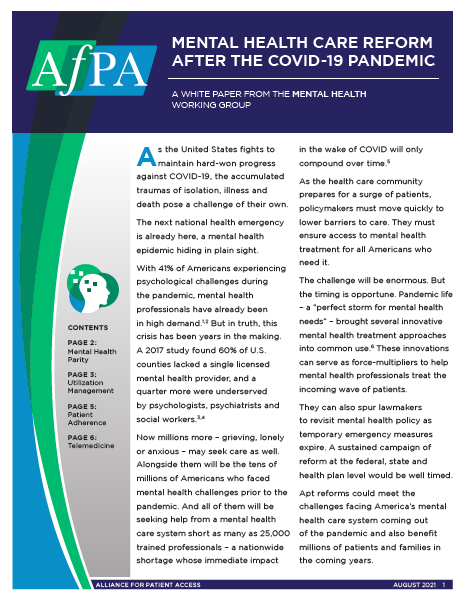Millions of Americans will need help recovering from the psychological traumas of the pandemic, so lawmakers should act quickly to improve mental health care policy.

So argues a new white paper from the Alliance for Patient Access’ Mental Health Working Group.
Today, the paper notes, 44 million Americans are struggling with mental health challenges, but only 20 million are in treatment. Following the death, illness, anxiety and isolation of the pandemic, those who remain untreated will need help more than ever. Yet most U.S. communities are currently underserved by mental health professionals.
The white paper calls for three approaches to reform that could address that gap.
First, policymakers should make good on the promise of mental health parity – insurance coverage for mental health care that’s as robust as coverage for standard medical care.
Past reforms have made important steps toward expanding Americans’ access to treatment, the paper notes, but widespread implementation remains a challenge.
Second, Congress should lower artificial barriers between patients and the medications they need.
Many insurance plans today force patients to try or even switch to drugs that maximize profits rather than patients’ wellbeing. These tactics can carry heavy costs for patient health. Plans may also obstruct patients’ access to new long-acting injectable medications, which could otherwise improve continuity of care for some people with severe mental health conditions by relieving them of the need to take medication daily.
As one mental health care provider explains, access restrictions mean that patients may battle symptoms “for six, maybe seven months before they can finally access the drug they need.”
And third, federal and state policymakers should look for ways to expand and extend access to telemedicine, which has proven valuable during the pandemic.
“Telehealth,” the paper notes, “can allow patients to sustain relationships with trusted health care providers despite moves, new jobs and schedules, or military deployments.”
These combined reforms, the paper concludes, can help the nation recover from both the acute trauma of COVID-19 isolation and grief and the long-running challenge of untreated mental illness.
Read the Alliance for Patient Access white paper to learn more.

